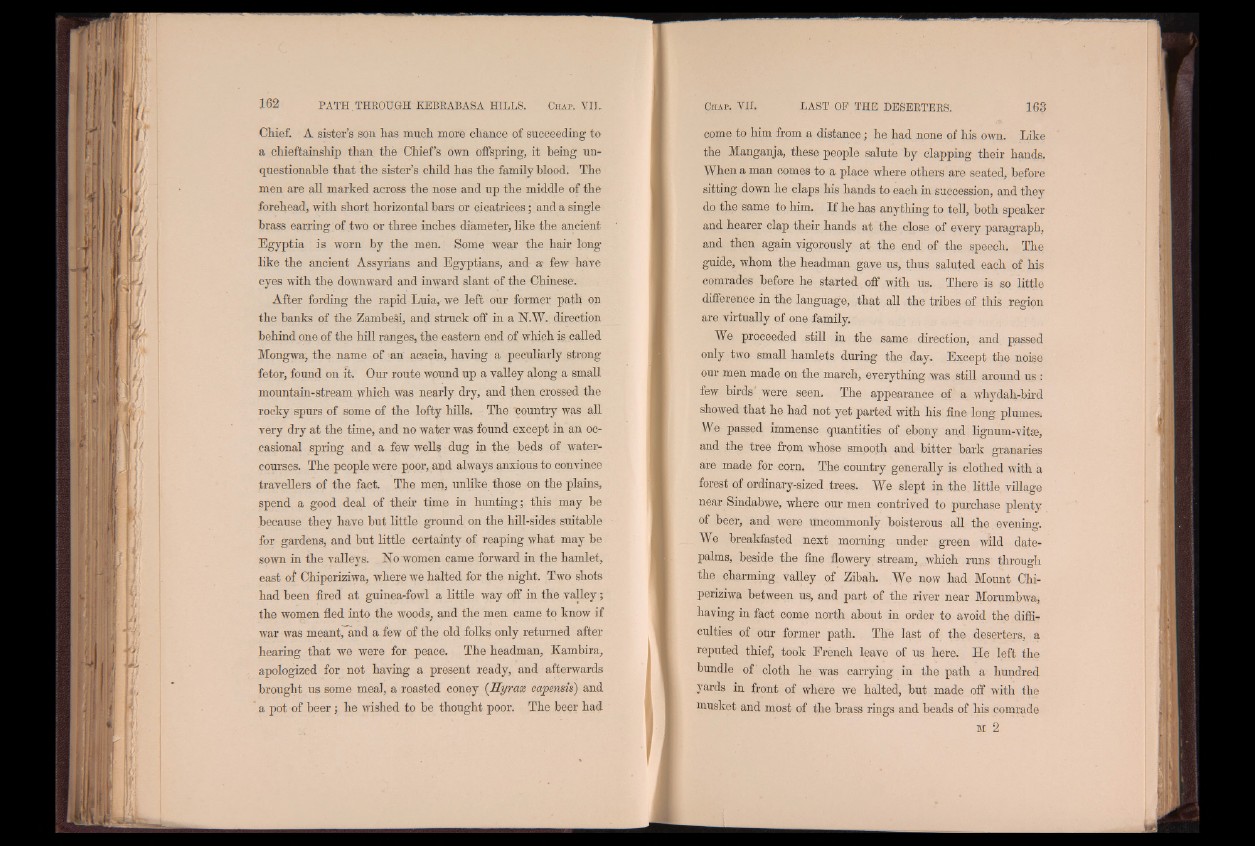
Chief. A sister’s son has much more chance of succeeding to
a chieftainship than the Chiefs own offspring, it being unquestionable
that the sister’s child has the family blood. The
men are all marked across the nose and up the middle of the
forehead, with short horizontal bars or cicatrices; and a single
brass earring of two or three inches diameter, like the ancient
Egyptia is worn by the men. Some wear the hair long-
like the ancient Assyrians and Egyptians, and a- few have
eyes with the downward and inward slant of the Chinese.
After fording the rapid Luia, we left our former path on
the banks of the ZambeSi, and struck off in a N.W., direction
behind one of the hill ranges, the eastern end of which is called
Mongwa, the name of an acacia, having a peculiarly strong
fetor, found on it. Our route wound up a valley along a small
mountain-stream which was nearly dry, and then crossed the
rocky spurs of some of the lofty hills. The country was all
very dry at the time, and no water was found except in an occasional
spring and a few wells dug in the beds of watercourses.
The people were poor, and always anxious to convince
travellers of the fact. The men, unlike those on the plains,
spend a good deal of their time in hunting; this may be
because they have but little ground on the hill-sides suitable
for gardens, and but little certainty of reaping what may be
sown in the valleys. No women came forward in the hamlet,
east of Chiperiziwa, where we halted for the night. Two shots
had been fired at guinea-fowl a little way off in the valley;
the women fled into the woods, and the men came to know if
war was meant,'"and a few of the old folks only returned after
hearing that we were for peace. The headman, Kambira,
apologized for not having a present ready, and afterwards
brought us some meal, a roasted coney (Hyrax eapensis) and
a pot of b eer; he wished to be thought poor. The beer had
come to him from a distance; he had none of his own. Like
the Manganja, these people salute by clapping their hands.
When a man comes to a place where others are seated, before
sitting down he claps his hands to each in succession, and they
do the same to him. If he has anything to tell, both speaker
and hearer clap their hands at the close of every paragraph,
and then again vigorously at the end of the speech. The
guide, whom the headman gave us, thus saluted each of his
comrades before he started off with us. There is so little
difference in the language, that all the tribes of this region
are virtually of one family.
We proceeded still in the same direction, and passed
only two small hamlets during the day. Except the noise
our men made on the march, everything was still around us :
few birds' were seen. The appearance of a whydah-bird
showed that he had not yet parted with his fine long plumes;
We passed immense quantities of ebony and lignum-vita;,
and the tree from whose smooth and bitter bark granaries
are made for corn. The country generally is clothed with a
forest of ordinary-sized trees. We slept in the little village
near Sindabwe, where our men contrived to purchase plenty
of beer, and were uncommonly boisterous all the evening.
We breakfasted next morning under green wild date-
palms, beside the fine flowery stream, which runs through
the charming valley of Zibah. We now had Mount Chiperiziwa
between us, and part of the river near Morurnbwa,
having in fact come north about in order to avoid the difficulties
of our former path. The last of the deserters, a
reputed thief, took French leave of us here. He left the
bundle of cloth he was carrying in the path a hundred
yards in front of where we halted, but made off with the
musket and most of the brass rings and beads of his comrade
M 2